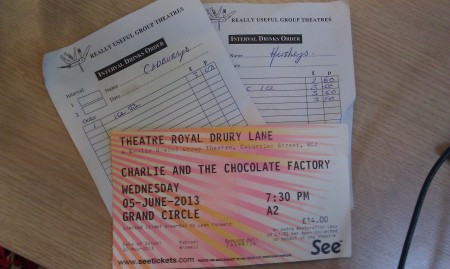Why, WHY would I go see a Chekhov play FOR THE SECOND TIME when I’d already seen it, and should be done with it for all time? Well … to be honest, the last (and first) time I saw it, I thought it was a pretty good play, not nearly as miserablist and pathetic as most Chekhov, with lots of comedy and not nearly as much of an air of “get your shit together, the revolution is about to come and wipe your entire lifestyle off of the pages of history” to it. And, well, Headlong has a really good reputation, and, finally, Lyn Gardner said I ought to (as in, directly to me, in addition to in her tips of the week column). I really thought I could get out of it … I mean, I was hardly going to Glasgow to see it on tour … but then I saw it was coming to Richmond. There were no excuses left: I knew they had £10 balcony seats and with a annual zone three travel card, well, getting there was no problem. The ticket was bought and off I went.
So … you don’t need to know about the plot, right? Fabulous aged actress spending some time at a country house with her sexy younger playwright boyfriend, getting peeved at her wanna-be playwright son (Alexander Cobb, with a delicious layer of puppy fat) and jealous of the son’s wanna-be actress not-quite-girlfriend (Pearl Chanda)? The really bad play the son does? Jealousy and tension and bad manners and a second act back at the country house “some time later” after rather a lot has changed for the two young people? Yeah, that Seagull, complete with all of the self-referential theater jokes (including a discussion of the symbolism of the dead seagull of Act One and how critics approve of plays that propound their own politics, said as if Michael Billington were being addressed directly) that, a century later, are actually still really funny.
It’s all set in the very much now, which means the droopy Goth character Masha (Jenny Rainsford) is tan and trim and wears short black dresses instead of Victorian mourning garb, and glam mom Irina (Abigail Cruttenden) has tousled blond hair and goes about in khaki capris and white Oxford shirts. So, you wonder, can it really work nowadays, when having a child out of wedlock isn’t really the kind of thing that ruins you for life, and women are perfectly capable of having careers and not required to get handouts from their relatives if they’re not employed? The answer is an unqualified yes – unless you have a problem with the use of four letter words on stage (as one couple I heard in the bar did) or find it extremely jarring when someone asks to have the horses brought around so they can go to the station. The hassle of modernizing everything would have been genuinely inappropriate and the out of place bits (frankly making a living off of short stories published ON PAPER seems more of an anachronism than plowing fields with animals) were easy enough to glide over once you were in the groove of the play.
And what a groove it is … so much sexual energy (my heavens!) and such a sense of watching lives teetering on the edge of catastrophe. The whole thing is brought into incredible relief by the stripped down set, just a gray backdrop (that occasionally has a little something sprayed onto it) and a giant trestle that plays the role of seasaw, dock, and dinner table equally well. You’ve got almost nothing to look at but the actors, and it’s really just perfect; it’s treating Chekhov like the Italians do their food – fresh oil, some pepper and salt is really all you need, because the miracle is in how fresh and tasty the ingredients are.
Normally I make really, really bad analogies, but this one is actually just perfect for this show. Chekhov shouldn’t need ultra realistic sets and 100% accurate costumes; he creates characters that are real enough that you can believe their feelings and their backstories. Headlong appreciates that and lets you experience everything that’s right in this play. And, well, maybe the second half was a little long, and it is certainly gloomy in parts, but it was basically perfect. I won’t be seeing any more Chekhov for a long time, but this was, actually, really worth the effort.
(This review is for a performance that took place on Saturday, June 1st, 2013. It opens tonight in Bath: the production continues touring until June 22nd.)
